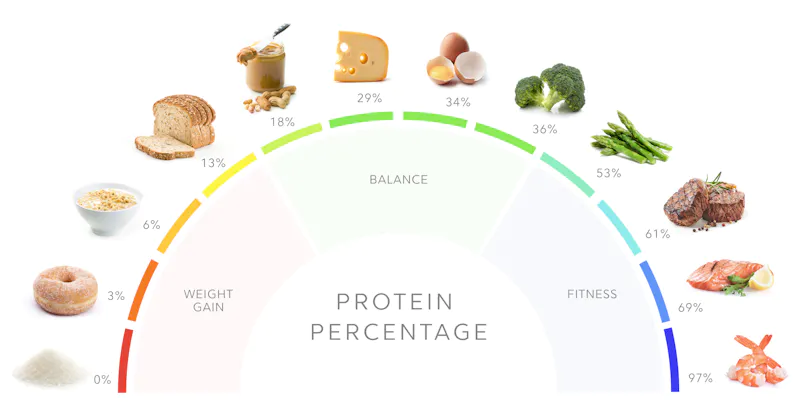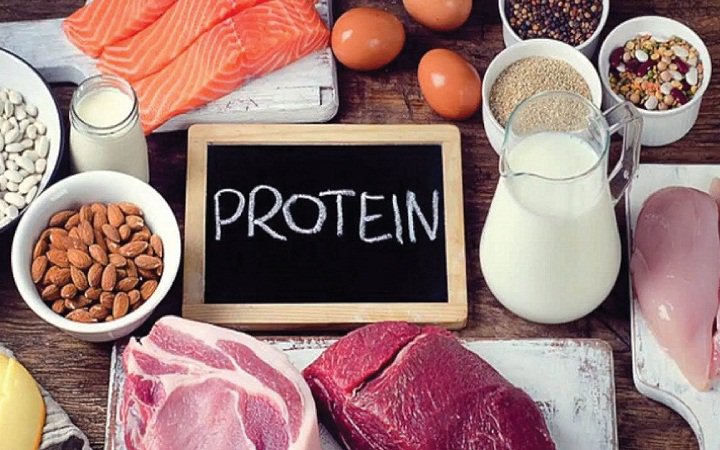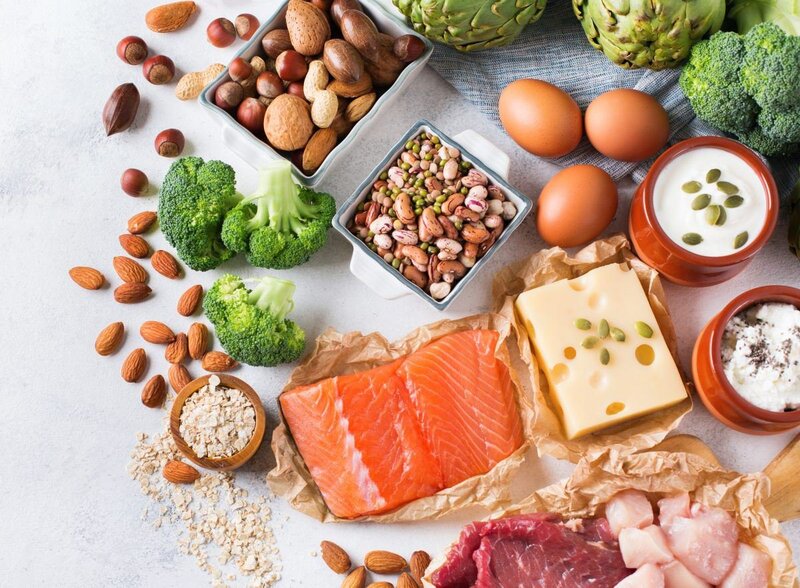Have you ever wondered why protein is so important to our health? What is Protein and some of its roles in the body? From the gym to the daily nutrition chart, protein is becoming a rising star in the world of wellness. But what makes protein the most important element in our diet? Join us in this world to better understand the impact of protein on health and how it affects muscle growth and overall health maintenance.
Protein is also known as protein – one of the essential amino acids that the body needs to provide daily to ensure life and strengthen the immune system. Although it is important, you only need to provide the right amount according to your needs. Eating too much protein will cause negative effects on the body. So what exactly is Protein and what are its effects on health? Please refer to BeDental through the article below!
What is protein?
Proteins are supermolecules formed from one or more amino acid chains connected together through peptide bonds.

The sequence of amino acid groups together will create many different types of Protein and in nature there are more than 20 types of amino acids, including 9 essential types that the human body needs to supplement through external food sources.
Formed from the attachment of many amino acid chains, after being created, the substance will exist for a short period of time and when the bonds between amino acids are lost, the substance will also be degraded.
It is an essential ingredient, accounting for about 50% of the total crude mass of cells and has the effect of restoring and regenerating health, so providing it daily is very important. Some common health conditions caused by Protein deficiency include: malnutrition, poor resistance, easy illness, slow development, thin people, etc…
See more: Tetracycline antibiotic ointment for skin. 5 Tetracycline side effects
The amount of protein needed daily depends on many factors such as weight, activity level, personal health goals, and specific body variables. According to the World Health Organization (WHO), the recommended level is about 0.8 grams of protein/kg body weight/day to maintain general health in adults with moderate activity.
However, for people engaging in heavy physical activity, especially those exercising to build muscle, protein intake may need to be higher. Fitness experts often recommend 1.2 to 2.2 grams of protein/kg of body weight/day for people who exercise regularly.
If you have specific goals such as gaining muscle, losing weight, or are in a particular stage such as pregnancy or breastfeeding, adjusting your protein intake should be discussed and guided by your doctor or specialist. nutrition.
The most important thing is to maintain a balance between the different food groups, including proteins, carbohydrates, and fats, to ensure a balanced diet that fully meets the body’s nutritional needs.
Some roles of Protein in health and survival
Protein constitutes tissues, nourishes and develops the body
Protein is a structural component that creates tissues, participating in many processes inside the body. Meanwhile, organisms are made up of many cells, and Protein is also present in the intracellular substance of the cells with the function of nourishing and growing them.

Protein participates in the body’s evolution through tissue formation, cell growth and division. Furthermore, Protein is also a catalyst for many metabolic and metabolic processes in the body.
See more: What is scalp fungus? 11 best anti-fungal shampoos
Protein participates in the exchange of oxygen and nutrients
Most nutrients are transported in the body from the absorption source of food digestion to the blood, entering each tissue and cell by processing by Protein. Oxygen is delivered from the lungs to cells in the blood through the transport of Hemoglobin Protein found in red blood cells.
Protein supports the body
White blood cells act as a defense layer to fight harmful bacteria that penetrate the body. The structure of these cells is protein. In addition, the immune system also produces other proteins, interferons, that function to fight viruses and other disease-causing bacteria.
This role is clearly seen when the body’s ability to produce protein and metabolize protein from food is poor, the immune system also declines, and people are more easily infected.

Supplement nutrients for cells
Protein accounts for about 10 – 15% of the main diet, adding a large amount of nutrition to cells, helping the body develop and maintain life.
Balance pH in blood.
In this role, Protein acts as a buffer to regulate pH and help circulatory systems transport ions better. In addition to balancing pH, Protein also pulls water from tissues to blood vessels to help balance and regulate ions in the body.
This role is clearly seen when low levels of protein in the blood cause water to accumulate in organs and tissues, leading to edema.
Necessary amount for the body
To perform the above functions, our body needs to provide enough protein according to needs, especially essential proteins. So how much protein do we need?
Women’s bodies need about 46g per day, but this amount also depends on age and intensity of physical activity. Men have a higher need, about 56 g per day, depending on the intensity of physical activity and body condition.

Many people think that protein is necessary for infants or sedentary people, but in reality, the adult body requires more to stay healthy.
It should be noted that in some cases you should eat less or selectively eat good proteins to help the body feel full for a long time and not reabsorb harmful substances such as: people with gout, people with kidney disease, etc…
See more: What are black apples? Some tips for using black apples
Some foods are rich in protein
Some foods rich in Protein include:
Poultry and eggs
Skinless chicken thighs or turkey cutlets contain extremely high levels of protein, a 3-ounce serving of chicken breast will provide up to 25g of protein.
Eggs are a protein-rich food that provides the body with about 6g and a diet of 1 egg a day has been used by many people because it provides it regularly without increasing the risk of cardiovascular disease.
Protein sources from chicken and eggs are quite abundant, but need to limit absorption if you have high cholesterol levels, cardiovascular disease or diabetes.
Seafood
Seafood is not only a protein-rich food but also extremely low in saturated fat, especially omega-3. When your body eats about 3 ounces of salmon steak, you will absorb about 17 grams of Protein without affecting the cardiovascular system.
Experts advise that each of us can consume fish at about 4 ounces each time, or twice a week as normal food.
Milk and dairy products
Foods made from milk contain a high amount of protein, which helps strengthen the immune system, lower blood pressure, and prevent the risk of diabetes. The content in skim milk and fat milk is different, in which fat milk provides a higher amount with about 18 – 20g per normal glass of milk.
Although it contains many protein ingredients, milk is not suitable for people with lactose intolerance, including the elderly.
So Bedental has joined readers to learn what Protein is? The role of Protein in human development and survival. For a healthy body, it is necessary to have a balanced diet and a variety of food groups to provide protein and other essential nutrients.
How to use protein properly
Consuming enough protein throughout the day can provide many health benefits, especially if you engage in strenuous exercise, want to build muscle, or follow a high-protein diet. Protein plays an important role in building and maintaining muscle, supporting cell regeneration, and providing the body with energy.
However, protein consumption needs to be done in a balanced and planned manner. Here are some things to keep in mind when using protein properly:
- Divide protein throughout the day: Instead of eating a large amount of protein in a single meal, try to divide protein consumption across meals throughout the day. This helps provide energy and muscle-building materials on a continuous basis.
- Choose a variety of protein sources: Diversify your protein sources by including meat, fish, milk and dairy products, soy, nuts, and other natural foods. This ensures you get different forms of amino acids and other nutrients from the protein.
- Adjust your protein intake accordingly: The amount of protein needed depends on your weight, activity level, and personal health goals. People who engage in a lot of physical activity may need higher levels of protein than those who are less active.
- Drink enough water: Maintaining water balance is important when consuming a lot of protein. Make sure you drink enough water to help your body process protein effectively.
See more: What is Alpha Choay? Uses, dosage and notes when using
BEDENTAL - TOP STANDARD DENTISTRY SYSTEM
In HANOI
Address 1: 7B Thi Sach St, Ngo Thi Nham, Hai Ba Trung Dist, Ha Noi. - 0934.61.9090
Address 2: No 129 Hoang Ngan, Yen Hoa, Cau Giay Dist, Ha Noi. - 0934.61.9090
In HO CHI MINH
Address 1: 53 -55 -57 Pho Duc Chinh St, Nguyen Thai Binh, Dist. 1, Ho Chi Minh. - 0766.00.8080
Working: 9am - 8pm everyday
Website: https://bedental.vn/en/


 Tiếng Việt
Tiếng Việt 한국어
한국어 日本語
日本語 中文 (中国)
中文 (中国)


